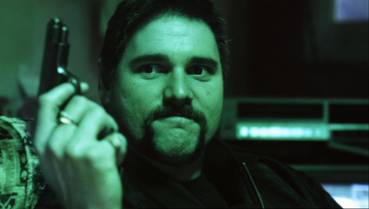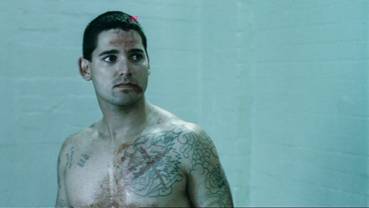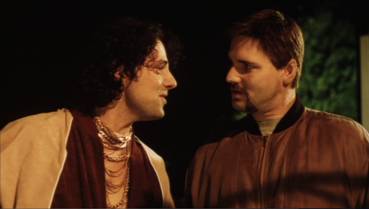|
In
his native Australia, Mark 'Chopper' Read is both a cultural
phenomenon and a genuine oddity. He has spent much of his adult
life behind bars for a variety of offences, including violent assaults on an unspecified number of Melbourne's
criminal underworld. He continued to build a reputation for himself in jail, where
his personal vendettas and acts of violence against other
prisoners eventually bounced back on him, resulting in an
assault that left him with a number of serious stab wounds,
inflicted by someone he had regarded as his friend. He became marked man, in part for shopping his would-be assassin (who
had accused Read of striking the first blow), and requested
a transfer to another jail, which was flatly refused. Read's
unconventional solution was to have his ears cut off by
another inmate. He was,
as he had predicted, transferred that very afternoon. As
you might imagine, this is not a man you'd want to cross
without good reason.
The
media attention that the court case and assisted self-mutilation attracted
was a sign of things to come, and on his eventual release from
jail Chopper did not become a fully
functioning member of society. He continued to dish
out violence to his fellow criminals, even when he
began informing for the police. Eventually he was banged
up again for malicious injury and wilful damage, where he wrote the autobiographical book Chopper: From
the Inside, which became a best-seller, despite Read's
own claim that "I can't even bloody spell!"

Former
music video director Andrew Dominik's first feature announces
itself up front as "a dramatisation in which narrative
liberties have been taken" and assures us that "it is not a biography."
As it happens, it may well be a lot closer to the truth
than this disclaimer suggests (the real reason for its inclusion
is revealed in the extras below). It all depends on whose
version of the truth you choose to believe, as in an inversion of the usual, Read has always claimed
to have hurt and killed far more people than the police
have been prepared to credit him for, and some of his fellow
criminals have suggested that his tales have more to do
with book sales than setting the record straight. It probably matters not. Chopper is still and intelligent, unsensational character study that refuses
to pass judgement on the behaviour of its enigmatic central
figure.
This does create an intriguing relationship between
Read and the audience, one in which we are appalled by his actions
and then charmed by his turn of phrase. He
is, in spite of his behaviour, an undeniably engaging
and always interesting character. A man of real wit
and humour, he is also unpredictable, paranoid, and often
contradictory. This is perfectly illustrated when he stabs would-be prison daddy Keithy
George in the throat, and as the man sits in a rapidly
expanding pool of his own blood, Read asks him if he is OK and
offers him a cigarette. Later, he extorts money from a local
drug lord by threatening and then wounding him, then begrudgingly
drives the man to hospital. It is typical of the image-conscious
Read that he happily admits to the shooting, but has repeatedly
denied his subsequent actions, adding indignantly that "it
defeats the purpose of me having shot him in the first place."
Elsewhere the violence is more sobering, as when Read breaks
into the house of his prostitute girlfriend
and viciously beats her, and it is the threat of what he
might do that makes a later meeting with his one-time assailant
so horribly tense. Whether Chopper is a misdirected unfortunate,
a publicity-seeking and insecure egomaniac, or an all-out
nutter is left very much for the viewer to decide.
The
film starts and ends with Chopper in jail, and the tale
told between is a compelling one. Much is down to Dominik's confident handling, often calmly observant
but occasionally taking a post-modernist detour to suggest
a coked-up mindset or, in the film's riskiest stylistic
move, recreate a key incident in speeded-up, straight-to-camera
rhyme. He even has the nerve to run the opening credits
over a montage of prison exteriors to the strains of 'Don't
Fence Me In', something that should send the heads of all
sensitive viewers into their hands, but somehow prompts
a wry smile rather than despairing groans.*

But what really sells it is Eric Bana's superb performance
as Read.** A successful stand-up and TV comic who had just
moved into acting the year Chopper went
into production, this was the role that made his name and
set him on the road to Hollywood and starring roles in the
likes of The Hulk and Munich.
For my money, this remains his most interesting
role to date and his most complex and impressive performance. So complete is his immersion
in the part that there will be a fair few who would
not even recognise the actor they know from his later work,
especially in the scenes following Chopper's release from
prison, when Bana's month-long diet of junk food had expanded his fame by thirty
pounds. He perfectly captures Chopper's almost
schizophrenic personality, all smiles and upbeat vocal whines
one moment and a ball of dangerous menace the next. It is
Bana, ultimately, who makes Chopper so fascinating,
at least as a movie character – he is one of many such creatures
who you'll be happy to engage with and enjoy on the
cinema screen, but who you would definitely not want to spend
a week in a holiday chalet with.
Although
very much a complete whole rather than a series of set-pieces,
there are many scenes that stand out and
are specifically memorable, none more so than Read's stabbing
at the hands of his friend Jimmy. I swear I have never seen
such a scene handled the way it is here. Wandering into
the realms of the surreal and flirting with a sort of homoerotic
intimacy, the sequence nonetheless feels strangely and disturbingly
realistic, from the horrifically graphic nature of the wounds
to Chopper's quietly confused reaction. And like the other
violence in the film, the assault is neither glamorised
or sensationalised – we see it for what it is, a very nasty,
very destructive act, and one that ultimately does only
harm to all.
Chopper
may lack insight into just what made Read the way he was
(a deliberate decision on the part of the director, as it
turns out), but it's still as absorbing character study
and a very fine crime drama with real bottle. While Bana
has gone on to bigger things, it's a real shame that we've
had to wait a ludicrous seven years for another film from
director Dominik in the shape of the upcoming and enigmatically
titled The Assassination of Jesse James by the Coward
Robert Ford. I, for one, and twitching with anticipation.
Framed
1.78:1 and anamorphically enhanced, this does at first glance
look to be a flawed transfer, with colours a little drained
and slight softness to the picture. But this would appear
to be Dominik's music video eye at work, as this is exactly
how the film looked in the cinema, and the transfer here
is certainly faithful to that. In addition, a variety of
colour tints used to create a particular atmosphere for
each sequence, something that is a little more pronounced
on the DVD transfer than it was on the big screen. Contrast
levels are good throughout – there is very occasional evidence
of grain and compression noise in areas of one colour, but
this is very minor and never distracting.

Stereo
and 5.1 surround tracks are both included, and here the
5.1 definitely has the upper hand – sound is crisply reproduced
and there is good separation and a subtle use of back speakers
in many scenes, especially those set in prison or the Bojangles
club, really creating a sense of place.
A
decent set of extras has been included on a DVD that doesn't
announce itself as any sort of special edition.
On
the main menu rather than in the special features is the
trailer, which gives a good flavour
of the film and has been decently transferred.
In
the special features section there appear to be only four
inclusions, but this is deceptive given the quality and
depth of content here.
A
Weekend with Chopper was shot Hi-8 by director
Dominik during the two days he and Eric Bana spent with the real
Mark 'Chopper' Read at his farm in Tasmania, and consists
of six short sequences in which Read relates stories that
helped shape scenes and character in the final film. The
exception is the first sequence, Year 2000 (2:37),
in which Read express his dismay that the film will take
so long to make and release. The others – Ears
(2:44), 60 Seconds (3;34), Pickin' Out Psycho
(4:12), Middle Class Crims (1:37) and Spaghetti
Marinara (0:55) – not only demonstrate just how disarmingly
charismatic the real Read is, but also the sometimes uncanny
accuracy of Bana's interpretation.
There
are five deleted scenes, all non-anamorphic
1.85:1, the first three with optional director's commentary.
All are fascinating for a differing reasons: Hooky the
Cripple (3:26) starts with the real Chopper telling
a story that is concluded by Bana playing him; The Billiard
Ball (1:20) not only helps flesh out the character
of Keithy George, the first of Chopper's in-film victims,
but also gives an idea of what the film looked like before
being colour-treated; Bluey in the Stabbing (3:26)
showcases Dan Wyllie's extraordinary ability to vomit on cue; Don't Get into Any Trouble (0:55)
expands on Chopper's relationship with his father; while
Ghost (0:13) would have taken the film briefly
into the area of experimental horror.
Next
up is the screen-specific commentary with director Andrew Dominik. His delivery is less than
animated, but he supplies a great deal of very interesting
information on the production and the background to key
scenes. Right at the start he intrigues by explaining that
the aforementioned "It is not a biography" disclaimer
was actually put there in case Read didn't like with the
film, giving the filmmakers something to point at to help their claim
that they had never intended to make a true-to-life biography.
This sort of detail turns up throughout, and helps clarify
not just gaps in the story, but Dominik's own reasoning
behind many of the sequences, even if a few questions remain
teasingly unanswered.
Finally
we have what for me, when I first heard about it, seemed
the most extraordinary extra or all, a screen-specific
commentary by the real-life
Mark 'Chopper' Read. To have a commentary track by the man
whose life your film is based on is unusual enough, but
a man with Read's past makes the decision a bold one. But
it pays off. Read's comments are fascinating throughout,
with a wealth of information (and at times probably dis-information) supplied about the facts behind the drama, in the process revealing more about his own attitude, views and personality
than any documentary could have. Occasionally, it is also
quietly disturbing, as with his offhand description of the
way he employed or was victim to violence, and is also genuinely
funny in places – my favourite comment comes during the
notorious ear-slicing sequence – "I cut my ears off
before anyone even heard of Quentin Tarantino." It
is also left to Read to reveal that the film's director,
Andrew Dominik, at the age of 8, lived on the same street
as Read's father and knew him personally.
Chopper
was never going to appeal to everyone, but if you have a
stomach for the violence – which through not frequent is
certainly strong – then this is a remarkable and offbeat
character study with a darkly comic edge that rewards repeat
viewings. Add to that a really class collection of extras
and the fact that the disc can nowadays be picked up for
under a fiver on-line and you have a no-brainer – if you
don't already have it, then track it down.
|